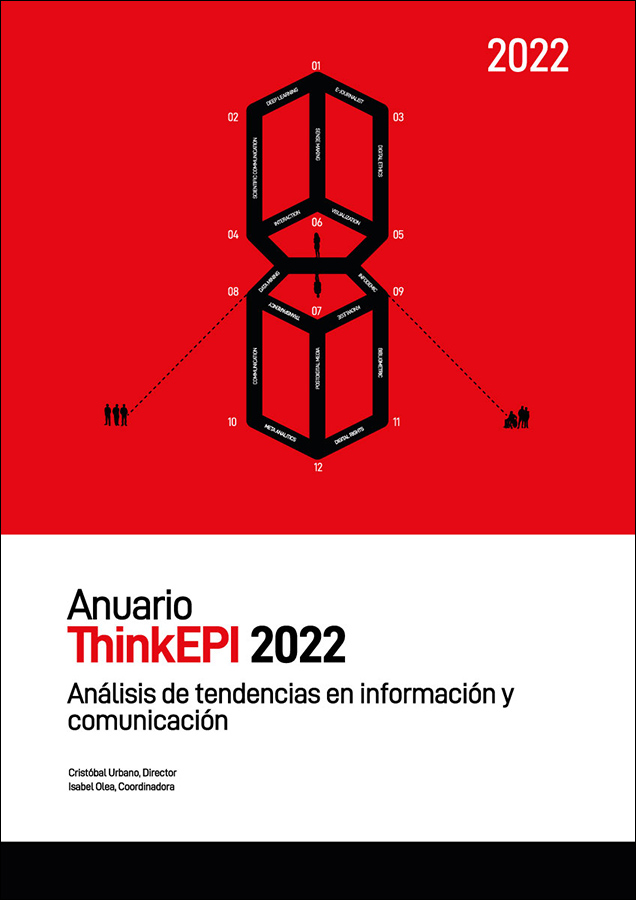AI-generated content: opportunities and threats
DOI:
https://doi.org/10.3145/thinkepi.2022.e16a24Keywords:
Content creation, Artificial intelligence, Deep learning, Entertainment, Disinformation, Intellectual property, Ethics of technologyAbstract
In recent years, there has been an exponential growth in developments aimed at the creation of textual, graphic, audio, and audiovisual content using artificial intelligence. These extraordinary technological achievements offer huge potential opportunities but, at the same time, are vulnerable to certain questionable uses that constitute real threats. This paper examines recent initiatives targeting the simulation of human writing, the creation of deepfake videos, voice cloning, and the generation of images from text prompts. Then, the potential benefits of these developments as well as the main dangers resulting from their misuse are discussed
Downloads
References
Barandy, Kat (2022). "Will artists be replaced by artificial intelligence?". Designboom, 10 agosto. https://designboom.com/art/sebastian-errazuriz-artificial-intelligence-ai-dall-e-replace-artists-illustrators-08-10-2022
Bender, Emily M. (2022). "Human-like programs abuse our empathy: even Google engineers aren´t immune". The Guardian, 14 junio. https://theguardian.com/commentisfree/2022/jun/14/human-like-programs-abuse-our-empathy-even-google-engineers-arent-immune
Bhargava, Cherry; Sharma, Pardeep-Kumar (eds.) (2022). Artificial intelligence: fundamentals and applications. Boca Ratón, FL: CRC Press. ISBN: 978 0367559700
Boden, Margaret A. (2018). Artificial intelligence: a very short introduction. Oxford: Oxford University Press. ISBN: 978 0199602919
Campesato, Oswald (2020). Artificial intelligence, machine learning and deep learning. Dulles, VA: Mercury Learning and Information. ISBN: 978 1683924678
Dale, Robert (2022). "The voice synthesis business: 2022 update". Natural language engineering, v. 28, n. 3, pp. 401-408. https://doi.org/10.1017/S1351324922000146
De-la-Cuadra-de-Colmenares, Elena; López-de-Solís, Iris; Nuño-Moral, María-Victoria (2014). "Uso de imágenes de archivo en publicidad audiovisual: estudio de casos". El profesional de la información, v. 23, n. 1, pp. 26-35. https://doi.org/10.3145/epi.2014.ene.03
Dean, Ian (2022). "You can now sell your DALL·E 2 art, but it feels murky". Creative bloq, 11 agosto. https://creativebloq.com/news/sell-your-dalle-2
Du-Sautoy, Marcus (2020). Programados para crear: cómo está aprendiendo a escribir, pintar y pensar la inteligencia artificial. Barcelona: Acantilado. ISBN: 978 84 17902 37 7
Dzieza, Josh (2022). "The great fiction of AI: The strange world of high-speed semi-automated genre fiction". The Verge, 20 julio. https://theverge.com/c/23194235
Franganillo, Jorge (2022). Formatos digitales: propiedades técnicas y contextos de uso. Barcelona: UOC; EPI Scholar. ISBN: 978 8491809470
Growcoot, Matt (2022). "Getty Images ban AI-generated pictures, Shutterstock following suit". PetaPixel, 21 septiembre. https://petapixel.com/2022/09/21/getty-images-ban-ai-generated-pictures-shutterstock-following-suit
Kreps, Sarah; McCain, R. Miles; Brundage, Miles (2022). "All the news that´s fit to fabricate: AI-generated text as a tool of media misinformation". Journal of experimental political science, v. 9, n. 1, p. 104-117. https://doi.org/10.1017/XPS.2020.37
Lyons, Benjamin A.; Montgomery, Jacob M.; Guess, Andrew M.; Nyhan, Brendan; Reifler, Jason (2021). "Overconfidence in news judgments is associated with false news susceptibility". PNAS, v. 118, n. 23. https://doi.org/10.1073/pnas.2019527118
McCausland, Elisa; Salgado, Diego (2022). "¿Sueñan los androides con ovejas eléctricas? Este es el arte que ya está creando la IA". El grito, 10 agosto. https://elconfidencial.com/el-grito/2022-08-10/arte-creando-inteligenci-artificial_3473503
Metz, Cade (2022). "AI is not sentient: why do people say it is?". The New York Times, 5 agosto. https://nytimes.com/2022/08/05/technology/ai-sentient-google.html
Nightingale, Sophie J.; Farid, Hany (2022). "AI-synthesized faces are indistinguishable from real faces and more trustworthy». PNAS, v. 119, n. 8. https://doi.org/10.1073/pnas.2120481119
Nogales, Elena G. (2022). "En BNElab hemos estado probando el modelo GPT-3 ["¦]". Twitter, 27 junio. https://twitter.com/esnogales/status/1541455846915416066
Osmanovic-Thunstrí¶m, Almira (2022). "We asked GPT-3 to write an academic paper about itself, then we tried to get it published". Scientific American, 30 junio. https://scientificamerican.com/article/we-asked-gpt-3-to-write-an-academic-paper-about-itself-mdash-then-we-tried-to-get-it-published
Pascual, Manuel G. (2022) "Dall·E mini, el popular generador automático de imágenes que hace dibujos sexistas y racistas". El País, 30 junio. https://elpais.com/tecnologia/2022-06-30/dall-e-el-popular-generador-automatico-de-imagenes-que-hace-dibujos-sexistas-y-racistas.html
Roose, Kevin (2022). "An AI-generated picture won an art prize: artists aren´t happy". The New York Times, 2 septiembre. https://nytimes.com/2022/09/02/technology/ai-artificial-intelligence-artists.html
Southern, Matt G. (2022). "Google says AI generated content is against guidelines". Search engine journal, 6 abril. https://searchenginejournal.com/google-says-ai-generated-content-is-against-guidelines
Vincent, James (2022a). "Shutterstock will start selling AI-generated stock imagery with help from OpenAI". The Verge, 25 octubre. https://theverge.com/2022/10/25/23422359
Vincent, James (2022b). "Getty Images CEO says firms racing to sell AI art could be stepping into illegal territory". The verge, 25 octubre. https://theverge.com/2022/10/25/23422412
Warzel, Charlie (2022). "I went viral in the bad way: a few lessons from my mistake". The Atlantic, 17 agosto. https://newsletters.theatlantic.com/galaxy-brain/62fc502abcbd490021afea1e/twitter-viral-outrage-ai-art
Walsh, Shelley (2022). "The best 10 AI writers & content generators compared". Search engine journal, 10 mayo. https://searchenginejournal.com/ai-writers-content-generators
Yu, Ning; Skripniuk, Vladislav; Abdelnabi, Sahar; Fritz, Mario (2021). "Artificial fingerprinting for generative models: rooting deepfake attribution in training data". Proceedings of the IEEE/CVF International conference on computer vision, p. 14.448-14.457. https://doi.org/10.1109/ICCV48922.2021.01418
Downloads
Published
How to Cite
Dimensions


